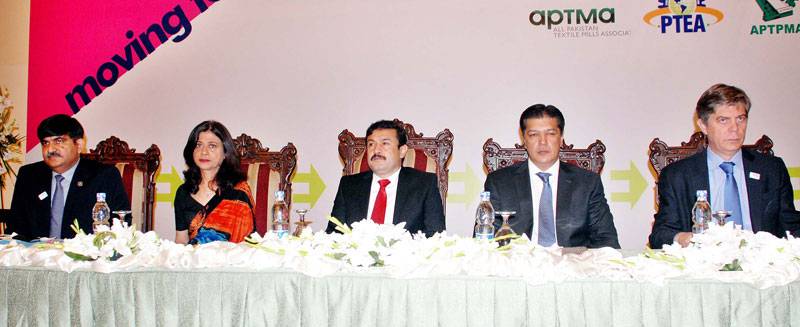LAHORE - Federal Minister for Textile and Industries Abbas Khan Afridi has said that that country is exporting around 80 per cent of textile products in raw shape without making any value addition, which neither payback good prices to Pakistan, nor create employment opportunities at local level.
He said that new Textile Policy would be implemented in the next financial year, entailing huge benefits and employment opportunities for the people attached to this export-oriented sector.
He was addressing the Pakistan Textile Summit at a local hotel, jointly arranged by the textile ministry, All Pakistan Textile Mills Association (Aptma) and Pakistan Textile Exporters Association (PTEA).
Though the speakers representing different textile chains had detailed discussions on the challenges being faced by the textile sector, yet several segments of the textile industry particularly the representation of apparel sector was missing. The textile industry’s officials also apologized for not inviting the representatives from apparel sector including the Pakistan Readymade Garments Manufacturers Association. The thin attendance was not reflecting that it was a national summit representing the whole country. The session-1 started with the keynote addresses delivered by the textile federal secretary and the minister Abbas Khan Afridi. Later, various textile experts, including S M Tanveer (Aptma central chairman), Mian Javed Iqbal (CEO, Sitara Fabrics) and Suhail Khan (ICI Limited) spoke on the overview of the industry, examining its potential and sustainability. The session-2 discussed cotton market challenges and opportunities, GSP plus reflections, value addition and garments sector potential.
In the last session, the Aptma group leader Ejaz Gohar, Sajid Minhas, former chairman of PRGMEA and Francesco Davido of ILO highlighted the issues related to textile sector’s sustainability, market challenges, labour laws and implementation.
Addressing the summit, the minister said that government was preparing new Textile Policy, which would incorporate all stakeholders of the textile sector. The creation of jobs was government’s priority, he said, citing that more jobs would help eliminate the menace of terrorism.
In the new Textile Policy, Afridi said that long-term solutions were being focused to ensure more facilitations to all components of this important sector.
He said that government was also working on the import of LNG (Liquefied Natural Gas), and it would be made available to CNG (Compressed Natural Gas) sector early next year. Around 56 companies had made investment in the oil and gas exploration sector that would help control the shortage of these sources of energy in Pakistan. The federal minister said that gas was being supplied to the textile sector properly and the efforts would also be made to maintain this supply even in peak winter season. He stressed the need for finding solutions for problems by setting aside the individual/personal interests, citing that ad hoc policies would not work to settle down the issues, which needed long-term planning. The federal minister said that value added sector had been given a package in the current budget, as this sector guaranteed better employment opportunities.
PRGMEA central chairman Ijaz Khokhar, while talking to The Nation, observed that the textile summit was actually a show of APTMA, as a large number of associations representing value-added sector and SMEs were not invited.
He said that participation of PRGMEA, Faisalabad power looms associations, Pakistan Knitwear Exporters Association, Pakistan Cotton Fashion Apparel Association, Towel Manufactures, Bed wear manufacturers and Hosiery Manufacturers Association was absolutely missing as no one from textile ministry bothered to contact even executive bodies of these associations.
Ijaz Khokhar said that value added sector is the highest tax payer and highest foreign exchange earner of more than $5 billion with contributing at least 60 per cent jobs in total textile employment generations. He added that apparel sector is also one of the top sectors in EDF contribution.
He asked the govt that instead of holding such a so-called gatherings of industrial elites, it should interact with real stakeholders, taking them onboard for policy making.
Wednesday, November 20, 2024
Country exports 80pc textile products sans value-addition
Textile summit misses SME, major sectors representation

Tribal elder among four killed in Bannu firing
November 20, 2024
Fazl always puts interests of Pakistan first: Naqvi
November 20, 2024
ATC issues non-bailable arrest warrants for KP CM Gandapur
November 20, 2024
CM Maryam launches country’s first dialysis card programme
November 20, 2024
ADB approves $500m to tackle climate change impacts
November 20, 2024
-
Hunger crisis to increase in South Sudan, warns UN
-
Hunger crisis to increase in South Sudan, warns UN
-
Pakistan’s judiciary champions climate justice at COP29 in Baku
-
Punjab struggles with persistent smog as Met Office forecast rainfall
-
Punjab residents face escalating smog crisis as pollution levels soar across country
-
Qatar says Hamas 'no longer welcome' in Gulf state
Digital Stagnation
November 20, 2024
Xi’s Red Lines
November 20, 2024
Last Call
November 20, 2024
Sindh & Indus
November 19, 2024
Another US Escalation
November 19, 2024
Tackle Corruption Within School Boards
November 20, 2024
To Be Opportunistic
November 20, 2024
Democratic Backsliding
November 20, 2024
Empowering Tharparkar through Skills Development
November 20, 2024
Why Not Use AI to Address Climate Change?
November 19, 2024
ePaper - Nawaiwaqt
Nawaiwaqt Group | Copyright © 2024





